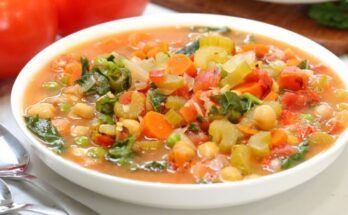Turkey Meatball Recipe: Looking for a delicious, healthier alternative to traditional meatballs? Turkey meatballs are a versatile, protein-packed option that’s perfect for weeknight dinners or meal prep.
Whether you’re a seasoned cook or a kitchen newbie, this step-by-step guide will show you how to make tender, flavorful turkey meatballs every time.
Ingredients for Turkey Meatballs
Essential Ingredients:
- 1 lb (450g) ground turkey
- 1/2 cup breadcrumbs (panko or regular)
- 1/4 cup grated Parmesan cheese
- 1 egg
- 2 garlic cloves, minced
- 1/4 cup finely chopped parsley
- 1 tsp onion powder
- 1 tsp dried oregano
- 1/2 tsp salt
- 1/4 tsp black pepper
Optional Add-ins for Extra Flavor:
- 1/4 cup finely chopped spinach or kale
- 1 tbsp Dijon mustard
- A pinch of red pepper flakes for heat
- Lemon zest for brightness
How to Make Turkey Meatballs
Step 1: Preparing the Ingredients
Before diving in, gather all your ingredients and prep them. Choose a high-quality ground turkey with around 93% lean meat for the perfect balance of flavor and tenderness. Too lean, and your meatballs may turn out dry; too fatty, and they might feel heavy.
Prepare your breadcrumbs, grate the Parmesan, mince the garlic, and chop the parsley. Doing this ahead ensures a smoother cooking process.
Step 2: Mixing the Meatball Mixture
In a large mixing bowl, combine the ground turkey, breadcrumbs, Parmesan cheese, egg, minced garlic, parsley, onion powder, oregano, salt, and pepper. Use clean hands or a fork to gently mix everything together. The key is not to overmix—this can make the meatballs dense instead of light and tender.
If you’re unsure about the seasoning, cook a small portion of the mixture in a skillet for taste-testing before shaping all the meatballs.
Step 3: Shaping the Meatballs
To make evenly sized meatballs, use a tablespoon or a small ice cream scoop. Roll the mixture into balls about 1 1/2 inches in diameter. Wet your hands with a little water or oil to prevent the mixture from sticking. Aim for uniformity in size to ensure even cooking.
Place the meatballs on a parchment-lined baking sheet or a large plate as you work.
Step 4: Cooking Methods
1. Baking in the Oven:
- Preheat your oven to 400°F (200°C).
- Arrange the meatballs on a lightly greased baking sheet.
- Bake for 15–20 minutes, flipping halfway through, until golden brown and fully cooked (internal temperature of 165°F/74°C).
2. Pan-Frying:
- Heat a tablespoon of oil in a skillet over medium heat.
- Add the meatballs, leaving space between them.
- Cook for 8–10 minutes, turning occasionally, until browned on all sides and cooked through.
3. Simmering in Sauce:
- Brown the meatballs in a skillet first, then transfer them to a pot of marinara or another favorite sauce.
- Simmer for 15–20 minutes to absorb the sauce’s flavors.
Step 5: Perfecting the Flavor
Don’t hesitate to taste and adjust. For an extra burst of umami, you can sprinkle freshly grated Parmesan or drizzle olive oil over the cooked meatballs. Garnish with more parsley for a vibrant, fresh touch.
Serving Suggestions
Turkey meatballs shine in a variety of dishes:
- Classic: Serve over spaghetti with marinara sauce.
- Low-carb: Pair with zucchini noodles or a fresh salad.
- Appetizer: Serve on toothpicks with a dipping sauce like tzatziki or spicy aioli.
- Sandwich: Tuck into a sub roll with marinara and mozzarella for a meatball sub.
Tips for Storing and Reheating
- Refrigerating: Store cooked meatballs in an airtight container for up to 3 days.
- Freezing: Place uncooked or cooked meatballs on a baking sheet, freeze until solid, then transfer to a freezer bag for up to 3 months.
- Reheating: Warm frozen meatballs in the oven at 350°F (175°C) for 15–20 minutes or simmer directly in sauce until heated through.
Health Benefits of Turkey Meatballs
Turkey is a lean source of protein, making it ideal for a balanced diet. It’s also lower in fat compared to beef or pork, which helps reduce calorie intake while still delivering delicious, satisfying meals.
FAQs about Turkey Meatball Recipe
1. What ingredients do I need for turkey meatballs?
To make turkey meatballs, you typically need ground turkey, breadcrumbs, an egg, minced garlic, chopped onion, parsley, grated Parmesan cheese, salt, pepper, and any additional seasonings you prefer.
2. How do I keep turkey meatballs from falling apart?
The key to keeping turkey meatballs intact is using a binder like breadcrumbs and eggs. Mix the ingredients well, but avoid overmixing, as this can make the meatballs dense.
3. Can I bake turkey meatballs instead of frying them?
Yes! Baking is a healthier alternative to frying. Preheat your oven to 400°F (200°C), place the meatballs on a greased baking sheet, and bake for 20–25 minutes or until cooked through.
4. How can I tell if my turkey meatballs are fully cooked?
Use a meat thermometer to check the internal temperature, which should reach 165°F (74°C). Alternatively, cut a meatball in half to ensure it is no longer pink inside.
5. Can I freeze turkey meatballs?
Absolutely! Cooked or uncooked turkey meatballs can be frozen. Place them on a baking sheet in a single layer, freeze until solid, and then transfer them to a freezer-safe bag for up to three months.
6. What sauces pair well with turkey meatballs?
Turkey meatballs are versatile and go well with marinara sauce, creamy mushroom sauce, teriyaki glaze, or even a light lemon butter sauce.
7. Are turkey meatballs healthy?
Yes, turkey is a lean protein, making turkey meatballs a healthier option. You can make them even healthier by using whole-grain breadcrumbs and baking instead of frying.
8. Can I make turkey meatballs gluten-free?
Certainly! Substitute breadcrumbs with gluten-free options like almond flour, crushed gluten-free crackers, or gluten-free oats.
Conclusion
Making turkey meatballs is simple, healthy, and incredibly rewarding. Whether baked, fried, or simmered in sauce, these meatballs offer a burst of flavor and versatility. Experiment with your favorite spices, herbs, or add-ins to make them uniquely yours.



